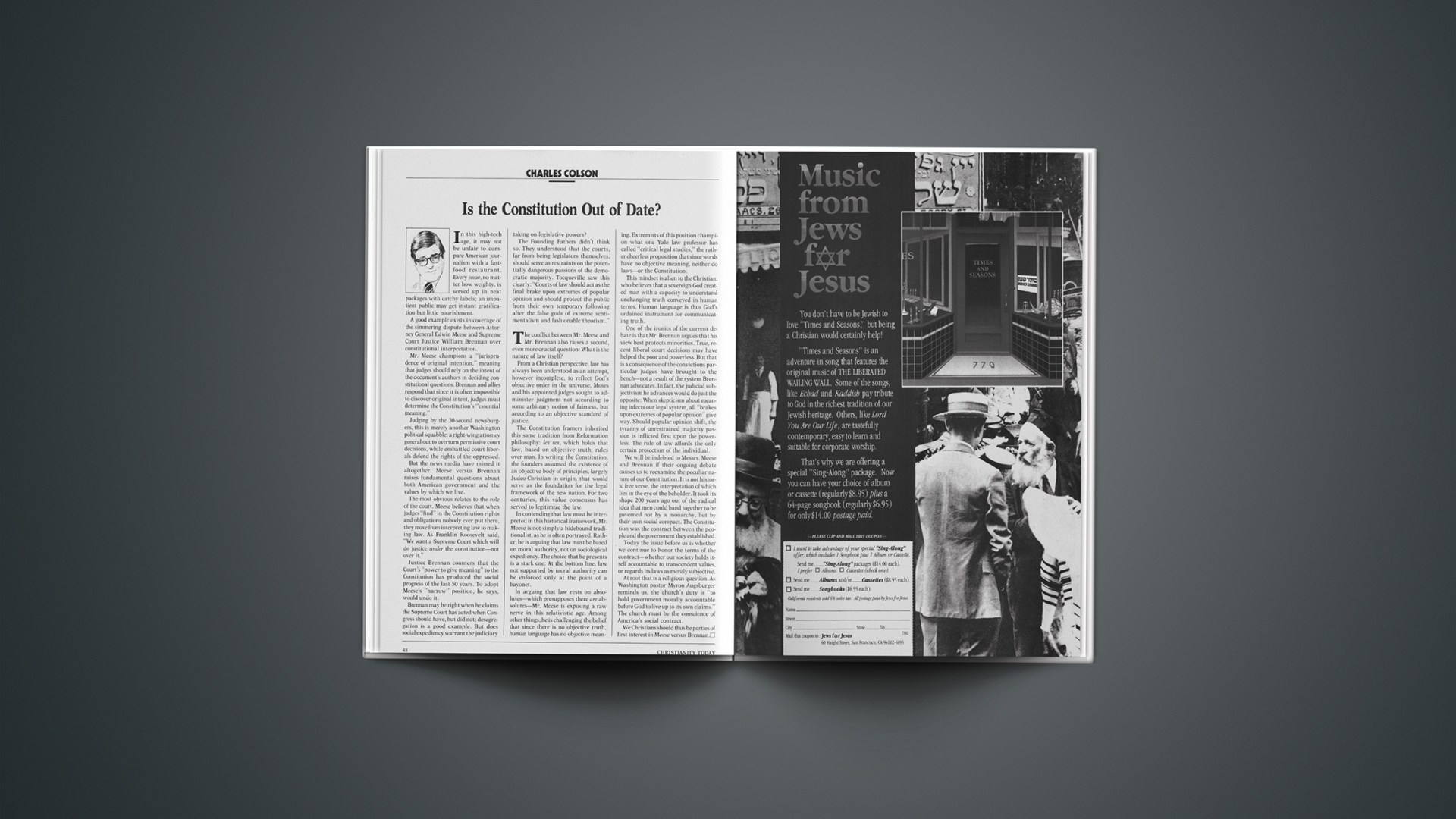In this high-tech age, it may not be unfair to compare American journalism with a fast-food restaurant. Every issue, no matter how weighty, is served up in neat packages with catchy labels; an impatient public may get instant gratification but little nourishment.
A good example exists in coverage of the simmering dispute between Attorney General Edwin Meese and Supreme Court Justice William Brennan over constitutional interpretation.
Mr. Meese champions a “jurisprudence of original intention,” meaning that judges should rely on the intent of the document’s authors in deciding constitutional questions. Brennan and allies respond that since it is often impossible to discover original intent, judges must determine the Constitution’s “essential meaning.”
Judging by the 30-second newsburgers, this is merely another Washington political squabble: a right-wing attorney general out to overturn permissive court decisions, while embattled court liberals defend the rights of the oppressed.
But the news media have missed it altogether. Meese versus Brennan raises fundamental questions about both American government and the values by which we live.
The most obvious relates to the role of the court. Meese believes that when judges “find” in the Constitution rights and obligations nobody ever put there, they move from interpreting law to making law. As Franklin Roosevelt said, “We want a Supreme Court which will do justice under the constitution—not over it.”
Justice Brennan counters that the Court’s “power to give meaning” to the Constitution has produced the social progress of the last 50 years. To adopt Meese’s “narrow” position, he says, would undo it.
Brennan may be right when he claims the Supreme Court has acted when Congress should have, but did not; desegregation is a good example. But does social expediency warrant the judiciary taking on legislative powers?
The Founding Fathers didn’t think so. They understood that the courts, far from being legislators themselves, should serve as restraints on the potentially dangerous passions of the democratic majority. Tocqueville saw this clearly: “Courts of law should act as the final brake upon extremes of popular opinion and should protect the public from their own temporary following after the false gods of extreme sentimentalism and fashionable theorism.”
The conflict between Mr. Meese and Mr. Brennan also raises a second, even more crucial question: What is the nature of law itself?
From a Christian perspective, law has always been understood as an attempt, however incomplete, to reflect God’s objective order in the universe. Moses and his appointed judges sought to administer judgment not according to some arbitrary notion of fairness, but according to an objective standard of justice.
The Constitution framers inherited this same tradition from Reformation philosophy: lex rex, which holds that law, based on objective truth, rules over man. In writing the Constitution, the founders assumed the existence of an objective body of principles, largely Judeo-Christian in origin, that would serve as the foundation for the legal framework of the new nation. For two centuries, this value consensus has served to legitimize the law.
In contending that law must be interpreted in this historical framework, Mr. Meese is not simply a hidebound traditionalist, as he is often portrayed. Rather, he is arguing that law must be based on moral authority, not on sociological expediency. The choice that he presents is a stark one: At the bottom line, law not supported by moral authority can be enforced only at the point of a bayonet.
In arguing that law rests on absolutes—which presupposes there are absolutes—Mr. Meese is exposing a raw nerve in this relativistic age. Among other things, he is challenging the belief that since there is no objective truth, human language has no objective meaning. Extremists of this position champion what one Yale law professor has called “critical legal studies,” the rather cheerless proposition that since words have no objective meaning, neither do laws—or the Constitution.
This mindset is alien to the Christian, who believes that a sovereign God created man with a capacity to understand unchanging truth conveyed in human terms. Human language is thus God’s ordained instrument for communicating truth.
One of the ironies of the current debate is that Mr. Brennan argues that his view best protects minorities. True, recent liberal court decisions may have helped the poor and powerless. But that is a consequence of the convictions particular judges have brought to the bench—not a result of the system Brennan advocates. In fact, the judicial subjectivism he advances would do just the opposite: When skepticism about meaning infects our legal system, all “brakes upon extremes of popular opinion” give way. Should popular opinion shift, the tyranny of unrestrained majority passion is inflicted first upon the powerless. The rule of law affords the only certain protection of the individual.
We will be indebted to Messrs. Meese and Brennan if their ongoing debate causes us to reexamine the peculiar nature of our Constitution. It is not historic free verse, the interpretation of which lies in the eye of the beholder. It took its shape 200 years ago out of the radical idea that men could band together to be governed not by a monarchy, but by their own social compact. The Constitution was the contract between the people and the government they established.
Today the issue before us is whether we continue to honor the terms of the contract—whether our society holds itself accountable to transcendent values, or regards its laws as merely subjective.
At root that is a religious question. As Washington pastor Myron Augsburger reminds us, the church’s duty is “to hold government morally accountable before God to live up to its own claims.” The church must be the conscience of America’s social contract.
We Christians should thus be parties of first interest in Meese versus Brennan.










